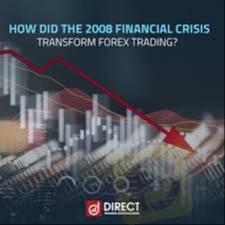
2025-02-14 03:54
IndustryTHE IMPACT OF THE 2008 FINANCIAL CRISIS ON FOREX
#firstdealofthenewyearastylz
The 2008 financial crisis had a huge impact on the foreign exchange (forex) markets, causing extreme volatility and major shifts in currency values. Here’s how it played out:
1. Flight to Safety (USD Strengthened)
During the crisis, investors panicked and moved their money into "safe-haven" assets like the US dollar (USD) and Japanese yen (JPY).
Even though the crisis started in the US, the USD strengthened because global investors saw it as a stable currency.
2. Collapse of Riskier Currencies
Currencies from emerging markets and those linked to commodities (e.g., the Australian dollar - AUD, Canadian dollar - CAD, and Brazilian real - BRL) weakened sharply.
Investors pulled money out of risky assets, causing these currencies to drop in value.
3. Euro and British Pound Fell
The Euro (EUR) and British pound (GBP) dropped because Europe and the UK were also heavily affected by the crisis.
The UK, in particular, saw a major banking crisis, leading to a sharp decline in the GBP.
4. High Volatility in Forex Markets
The crisis caused wild swings in exchange rates, making forex trading highly unpredictable.
Traders had to deal with liquidity issues, meaning it was harder to buy or sell currencies in large amounts without moving the price significantly.
5. Interest Rate Cuts and Quantitative Easing (QE)
Central banks, including the US Federal Reserve, cut interest rates close to zero to stimulate the economy.
The Fed also introduced quantitative easing (QE)—a policy of printing money to buy assets, which later weakened the USD.
6. Long-Term Effects
The USD eventually declined after the Fed's QE program.
Commodity-based currencies (AUD, CAD) rebounded as global demand recovered.
The crisis led to regulatory changes, with banks facing stricter rules to prevent excessive risk-taking in forex markets.
Like 0

Momo403
Broker
Hot content
Industry
Event-A comment a day,Keep rewards worthy up to$27
Industry
Nigeria Event Giveaway-Win₦5000 Mobilephone Credit
Industry
Nigeria Event Giveaway-Win ₦2500 MobilePhoneCredit
Industry
South Africa Event-Come&Win 240ZAR Phone Credit
Industry
Nigeria Event-Discuss Forex&Win2500NGN PhoneCredit
Industry
[Nigeria Event]Discuss&win 2500 Naira Phone Credit
Forum category

Platform

Exhibition

Agent

Recruitment

EA

Industry

Market

Index
THE IMPACT OF THE 2008 FINANCIAL CRISIS ON FOREX
 Hong Kong | 2025-02-14 03:54
Hong Kong | 2025-02-14 03:54#firstdealofthenewyearastylz
The 2008 financial crisis had a huge impact on the foreign exchange (forex) markets, causing extreme volatility and major shifts in currency values. Here’s how it played out:
1. Flight to Safety (USD Strengthened)
During the crisis, investors panicked and moved their money into "safe-haven" assets like the US dollar (USD) and Japanese yen (JPY).
Even though the crisis started in the US, the USD strengthened because global investors saw it as a stable currency.
2. Collapse of Riskier Currencies
Currencies from emerging markets and those linked to commodities (e.g., the Australian dollar - AUD, Canadian dollar - CAD, and Brazilian real - BRL) weakened sharply.
Investors pulled money out of risky assets, causing these currencies to drop in value.
3. Euro and British Pound Fell
The Euro (EUR) and British pound (GBP) dropped because Europe and the UK were also heavily affected by the crisis.
The UK, in particular, saw a major banking crisis, leading to a sharp decline in the GBP.
4. High Volatility in Forex Markets
The crisis caused wild swings in exchange rates, making forex trading highly unpredictable.
Traders had to deal with liquidity issues, meaning it was harder to buy or sell currencies in large amounts without moving the price significantly.
5. Interest Rate Cuts and Quantitative Easing (QE)
Central banks, including the US Federal Reserve, cut interest rates close to zero to stimulate the economy.
The Fed also introduced quantitative easing (QE)—a policy of printing money to buy assets, which later weakened the USD.
6. Long-Term Effects
The USD eventually declined after the Fed's QE program.
Commodity-based currencies (AUD, CAD) rebounded as global demand recovered.
The crisis led to regulatory changes, with banks facing stricter rules to prevent excessive risk-taking in forex markets.
Like 0
I want to comment, too
Submit
0Comments

There is no comment yet. Make the first one.

Submit
There is no comment yet. Make the first one.